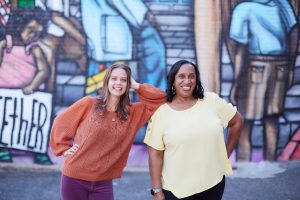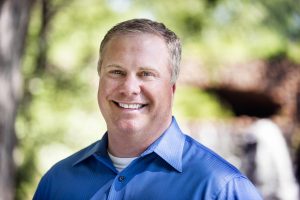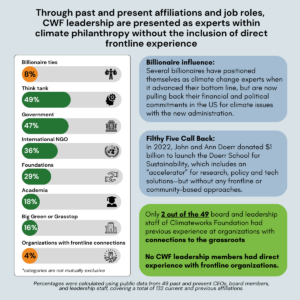Editor’s note: Check out this post on NCRP’s Medium page for a Q&A with authors Jason Baisden, Paula Swepson and Mary Snow.
Many rural areas have strong agricultural industries, deep manufacturing roots and committed local residents. Yet, people living in these communities are less likely to have access to health services and have a lower life expectancy than their urban neighbors.
One of those communities is McDowell County, N.C. in the Appalachian Mountain region of western North Carolina. This scenic location provides abundant natural assets such as Pisgah National Forest, Linville Caverns, the Catawba River, Lake James and the Blue Ridge Parkway. These attractions draw tourists, retirees, and sightseers. Like many rural areas, McDowell County has felt the effects of lost manufacturing, but has been able to maintain and attract key employers.

Mary Snow (left) and Paula Swepson
Since 2012, the Kate B. Reynolds Charitable Trust has worked with Healthy Places NC in counties like McDowell to develop change networks and build capacity for residents to lead the work. Residents have set clear goals and strategies and are tackling health issues as well as social determinants of health — the factors outside of the medical office that impact a person’s health — head on.
They are working on critical health concerns including: obesity reduction; substance misuse; access to care; and adverse childhood experiences. Throughout the Healthy Places NC journey, the trust has learned valuable lessons that have helped reshape its grantmaking approach and can serve as a guide to the field:
1. Start by listening. Each community is unique, but your outcomes-focused process should remain the same: Community members are the experts on what they need to live happy, healthy lives. They also know the barriers that exist as well as the dynamics and historical factors behind them. And when listening it is key to seek both feedback and hard truths.
For example, one of our strong partners in McDowell, West Marion Community Forum, expressed their frustration with the trust with regards to funding. They attempted to bring several programs under one umbrella, as part of their overall strategy in the county, only to be told by us to “break it up” into several different grants.
Over time, as Healthy Places evolved, our strategy and approach shifted, and we began to question why these various projects weren’t organized under one coordinating initiative (West Marion Community Forum). Because we had built a strong relationship, we were able to have an honest conversation, which has helped us not only in McDowell County but in other communities as well.

Jason Baisden
2. Make a long-term commitment. Creating change is not a short-term project so it is critical to build real and lasting relationships with community partners. The trust has been working in McDowell County for close to 10 years to build community trust.
For the last 5 years we have used that work to intentionally amp up targeted outreach and relationship building with communities of color. This long-term commitment has supported a growing infrastructure of changemakers in McDowell and our other Healthy Places communities.
They are now being tapped by other funders on key initiatives, and we anticipate partnering with them in the coming years as a part of our growing equitable health outcomes work.
3. Put equity at the center of everything you do. Invest in community engagement strategies that are driven by those most impacted by inequities. Ensure that people of color and those with low incomes have a voice in helping their community succeed — and begin to change historic and intentionally racist systems in equitable ways.
This needs to be more than aspirational. Get out of your office and have meals with community members. Show up at their events. Find ways to create small “wins.”
Once you have found local community members and leaders, invest in them and in the creation of the organizations they run or need to create. And when you do, fund their organizations at the amount needed to do the work. Bake in general operating funds and resources that will be required as they seek additional funding from sources.
4. Champion grassroots leaders and bring unlikely partners to the table. This support ripples out into the community and sends a powerful signal to local institutions and policymakers that community partners should not be sidelined or excluded from decision-making spaces.
Support the capacity of leaders of color and lift up new voices, so everyone has a seat at the table in determining just solutions. Not only will you increase their voice in the community, but you can also raise their profile with other funders.
West Marion Community Forum was able to leverage initial Kate B. Reynolds Charitable Trust funding to secure a $600,000 grant from Blue Cross Blue Shield of North Carolina Foundation to work on systems change with the hospital system in McDowell.
5. Invest in impact. Enhance the effectiveness of your grantmaking by increasing power, support and capacity in communities that have been marginalized. Boost promising and proven programs that can be scaled up and projects that activate systems change.
Our work in McDowell County and with West Marion Community Forum in particular is a tribute to this approach. You can read more about it in Paula Swepson and Mary Snow’s recently published Shift Happens, but, as a teaser: By amplifying emerging leaders and organizations that represent communities of color and others that had been traditionally marginalized, we have seen incredible results.
This includes a local leader outside of the political system running to be a county commissioner, snow removal happening in Black communities first instead of last, the passing of a minimum housing standard in the city of Marion, voter education campaigns and forums, as well as the expansion of the community forum model to additional communities in the county.
Paula Swepson and Mary Snow are leading community organizers in the Southern Appalachian region. In the past 4 years, they have raised more than $3 million from public and private foundations for rural community engagement and grassroots movement building initiatives. They have hosted more than 150 community forums, bringing together citizens to discuss issues like housing, immigration, racial equity and policing. They registered new voters, organized candidate forums and engaged lawyers to discuss voting rights. In 2020, they raised $20,000 to create a community mural that memorializes the fight for civil rights in Old Fort, N.C.
Jason Baisden is the senior program officer at the Kate B. Reynolds Charitable Trust. Learn more.
































































































































































































































































































































































































































